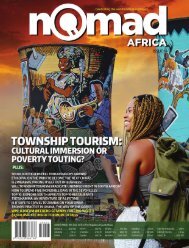Nomad_Africa_Edition12
Born from a passionate desire to dispel the negative perceptions which the world has held of the African Continent, and to replace it with a positive focus, Nomad Africa magazine celebrates life on the African continent. Covering stories from all countries and all cultures, it strives to include unique tourist attractions, business development, technology and investment opportunities as well as looking at the continent's cultural heritage. Nomad Africa inspires and breeds a conscious, knowledgeable generation of visionaries among our own, and influences positive perceptions and appreciation for the true worth of Africa worldwide.
Born from a passionate desire to dispel the negative perceptions which the world has held of the African Continent, and to replace it with a positive focus, Nomad Africa magazine celebrates life on the African continent. Covering stories from all countries and all cultures, it strives to include unique tourist attractions, business development, technology and investment opportunities as well as looking at the continent's cultural heritage. Nomad Africa inspires and breeds a conscious, knowledgeable generation of visionaries among our own, and influences positive perceptions and appreciation for the true worth of Africa worldwide.
Create successful ePaper yourself
Turn your PDF publications into a flip-book with our unique Google optimized e-Paper software.
Patrice Lumumba<br />
PATRICE ÉMERY<br />
LUMUMBA:<br />
THE GREAT AFRICAN MARTYR<br />
From its independence from Belgium in 1960, the Democratic Republic of Congo<br />
(DRC) has been left with an unstable political system as its tribal leaders have had<br />
more power than the central government. Prevalent on the world’s mind when DRC<br />
is mentioned are the names such as Kabila, Lumumba, Mobuto and ultimately, the<br />
first and second Congo war.<br />
Words: KRISTIE OMAR<br />
from 1971 to 1997, the country<br />
was officially the Republic of<br />
Zaire; a change made by<br />
then ruler Gen. Mobutu Sese<br />
Seko to give the country<br />
what he thought was a more<br />
authentic <strong>Africa</strong>n name.<br />
“Zaire” is a variation of a term<br />
meaning “Great River” in local Kongo language;<br />
like the country’s current name, it<br />
refers to the Congo River, which drains a<br />
large basin that lies mostly in the republic.<br />
Unlike Zaire, however, the name Congo has<br />
origins in the colonial period, when Europeans<br />
identified the river with the kingdom<br />
of the Kongo people, who live near its<br />
mouth. Following the overthrow of Mobutu<br />
in 1997, the country’s name prior to 1971, the<br />
Democratic Republic of the Congo, was reinstated.<br />
Congo subsequently was plunged<br />
into a devastating civil war; the conflict officially<br />
ended in 2003, although fighting continued<br />
in the eastern part of the country.<br />
A nation as big as Western Europe, the Democratic<br />
Republic of Congo is a topic for<br />
most political, social and human rights activists<br />
for decades. A quarter century of experimentation<br />
with Marxism was<br />
abandoned in 1990 and a democratically<br />
elected government took office in 1992. A<br />
brief civil war in 1997 restored former Marxist<br />
President Denis Sassou-Nguesso, and ushered<br />
in a period of ethnic and political unrest.<br />
Southern-based rebel groups agreed<br />
to a final peace accord in March 2003, but<br />
the calm is tenuous and refugees continue<br />
to present a humanitarian crisis.<br />
Has all this fighting made us forget what the<br />
Republic of Congo offers us as a continent?<br />
Congo is rich in natural resources. It boasts<br />
vast deposits of industrial diamonds, cobalt,<br />
and copper; one of the largest forest reserves<br />
in <strong>Africa</strong>; and about half of the hydroelectric<br />
potential of the continent. And what<br />
about the Congolese leaders that have defiled<br />
and defined new political directions in<br />
the country and hence affected <strong>Africa</strong> as a<br />
whole? Perhaps, to this day, the most celebrated<br />
is Patrice Émery Lumumba.<br />
THE BIRTH OF A MARTYR<br />
Born in 1925 during Belgium’s rule of the<br />
Congo, Patrice Émery Lumumba was<br />
brought into a world of racial segregation.<br />
Large numbers of white immigrants, many<br />
from Belgium, who moved to the Congo<br />
after the end of World War II, came from<br />
across the social spectrum, but were<br />
nonetheless always treated as superior to<br />
black people. From the tiny village of Onalua<br />
in northeastern Kasai, a Congolese<br />
province, at the time of his birth, the Congo<br />
was still a colony of Belgium.<br />
As a child, Patrice Lumumba attended<br />
Protestant and then Catholic schools run by<br />
white missionaries. At the mission schools,<br />
Lumumba proved to be a fine student, even<br />
though the mud-brick house he lived in had<br />
no electricity and he could not study after<br />
Issue 12 | ...Celebrating the world’s richest continent | www.nomadafricamag.com | 55





